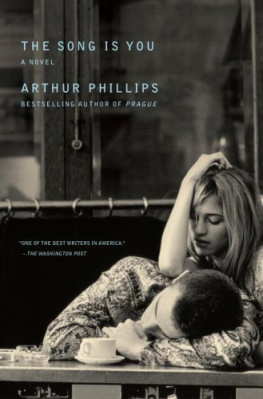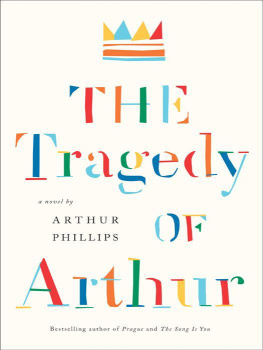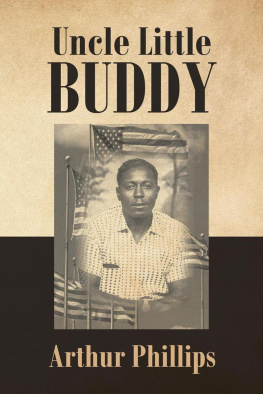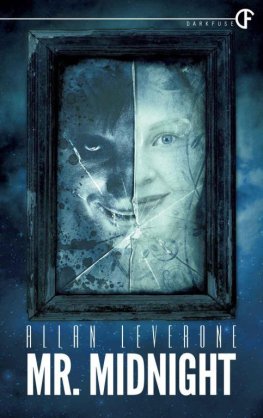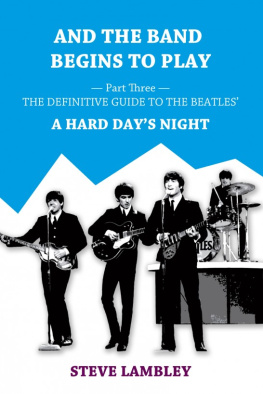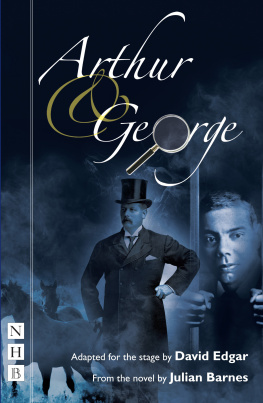ALSO BY ARTHUR PHILLIPS
Angelica
The Egyptologist
Prague
FOR JAN, OF COURSE
The Muses are virgins Cupid, when sometimes asked by his mother Venus why he did not attack the Muses, used to reply that he found them so beautiful, so pure, so modest, bashful, and continually occupied in the arrangement of music, that when he drew near them he unstrung his bow, closed his quiver, and put out his torch, since they made him shy and afraid of injuring them.
FRANCOIS RABELAIS,
Gargantua and Pantagruel, 3:31
JULIAN DONAHUES FATHER was on a Billie Holiday record.
He loved her music, back when it was hip, not fashionable (a fans distinction). April of 1953, on leave from the Army, four days prior to his deployment to Korea, wherewho knows?his eighteen-pound contribution to that eternal stalemate may have been the final increment of military sacrifice necessary to balance the scales, prevent defeat, and fix the parallel, he took the train from Virginia up to New York, and he saw his idol perform at the Galaxy Theater, which is nowif you are the sort to track down historic sitesa three-story Banana Republic with a framed photo of Holiday on the butter-yellow wall of the dressing room all the way to the left.
He spent more than he should have for a third-row seat in the center, arrived early, and lived ninety of the best minutes of his life, shaking his head and sighing, smiling with half his mouth until, without thinking or hesitating, surprised by the strength of his desire, he shouted, Waterfront! during a bustling near silence after the applause for My Man had receded and Billie was consulting with her band, her back to the audience, her golden calves completing the electrical circuit between the hem of her silver skirt and the straps of her black shoes. I Cover the Waterfront!
She peered over her shoulder. Somebody say something? she purred, sly and sidelong, and laughter speckled the hall. She turned, stepped forward, shaded her eyes against the spotlights, and squinted down into the front rows. Was that you? She had addressed him directly.
Yes, maam.
Polite, too. The audience cheered. Handsome white soldier, she mused, and in his retellings for years after, she now levitated slightly, and every other noise faded away as his goddess coolly examined him groveling down in the pit, eye level with her feet, less than a childa worshipper. Did you have a request, honey?
Miss Holiday, I sure would love to hear I Cover the Waterfront.
Would you now? She kept her eyes on him as she turned her head, only a little, and called to her band: Well, boys, the pretty gray GI wants Waterfront, so lets do that for him. Dont want him to put us on report, now, do we?
He later wondered, often, whether she, way up there, could feel the empresss power she held over him. Literally anything, he would tell his second son (named for an alto man whose first album came out a decade before the boys birth, and after his wife hadfor the second time, in some casesrejected Miles, Charlie, Harry, Dizzy, Percy, Woody, Herbie, Teddy, Jimmy, Lionel, Dexter, Lester, Wynton, Wardell, Hampton, Duke, Count, Chet, Nat, Hank, Thad, Mal, Art, Max, Milt, Bix, Joao, and Illinois), I would have done anything for her, Julian.
Billie counted off the tune and started the pre-refrain verse, with only the piano accompanying: Away from the city , something extra, that expendable introductory piecemost singers didnt know it, and most instrumentalists never played itand the soldier hoped that Holiday, having sensed that he was different from all the others, was perhaps granting him more than she allowed lesser supplicants. She hit the chorus, sang the title, and the bass and drums entered, and minor fans applauded, having only then recognized the song, and the thought intruded: he would gladly have killed for her. In the lyrics, she was waiting by the water, longing for her lovers ship to return. She was singing the music he had ached to hear, was singing it to him, as if he, soon to head off by sea to war, was that lover for whom she pined, and this thought vibrated in him like a recently arrived arrow: he would murder the officer to his left for her, or the young woman to his right. He knew this was strange. He was not a violent man, but this was, as he later said, how love felt just then. Having been lofted up to this pinnacle of musical rapture, he looked down at the world of men and considered erasing it.
And the urge passed. By the second eight bars he could examine this gift and the real woman offering it to him. She sang with her eyes closed. He watched the swaying hibiscus in her sparkling hair, could almost smell it. He imagined finding a role to play somewhere in her life, the ease he would feel among her Negro friends, how effortlessly he would adapt to the role of efficient business manager and then earn the right to long and glorious nights drinking with the band, friendship with Lester Young or Jimmy Rowles, and then he and she might walk into the empty street, and he would drape her fur stole around her neck. They would lean into each other as they moved into the light of the streets single lamp and he whispers a joke about one of their musician friends resemblance to a basset hound, and her gentle laughter becomes the sound of her hands clasping around his biceps, compressing the cloth of his sleeve Onstage, tonight, she sang the word stally, as if she had forgotten if it was starlit or starry and forged a hybrid instead. The soldier told himself he had flustered her.
She hit the bridge, and he wondered if he could still learn an instrument and then be able to travel with her, worried whether the rumors of her continued use of narcotics were true, and he knew, too, that the songhis songwas more than half-sung already. It was not that he hadnt heard ithe had heard every breath, every sneeze of the hi-hat cymbal, the brushed snare, each profound thump and wood rattle as the bassists left hand crept up and down his instruments black neck like half of a hesitantly aggressive spiderbut the song had not cast him into thoughtless ecstasy, only inspired all this mad musing. He imagined this song playing during a party or a wedding, thought of children and vast front yards, imagined boys not unlike you, he told Julian. He thought of growing old in New York or dying young in Korea, of learning to play jazz or distinguishing himself in battle, rescuing his platoon. She finished her chorus.
The tenor-sax man stepped forward to take sixteen bars. It was not Lester Young, the President, at whose side Billie had made so many classic recordings, or Paul Quinichette, his replacement in the old Basie band, called the Vice President for how closely he duplicated Youngs sound, but an imitator of Quinichettes. This tenor, derivative of a derivative, had been dubbed the Speaker of the House by one of the jazz magazines, prompting dissenting correspondence from Julians father, who, rating men like Getz, Cohn, and Sims ahead of this guy, insisted he was, at best, Secretary of Agriculture.
Billie strode back in at the bridge and sang out the chorus, and when she finished, she opened her eyes and smiled toward the third row, winked and blew a kiss at where she recalled her fan having been, but the descending head-on spotlights blinded her, and the kiss drifted off target a little to the left.
The woman to his right turned to himwhile he was still as dazzled by Holiday as Holiday was by the lightsand, as if stunned herself by the reflection of the singer off his face, she felt herself become light-headed, too. She fell the first distance into love with the man so in love with the singer. You had, she later told him in French-accented English, a face of such perfect happiness, but only for an instant, and then you were so terribly sad again. (The sad face, oh yeah, they love the sad face, he used to joke whenever Julian caught him sitting alone, believing himself unobserved, buckling under pain or memory.)

